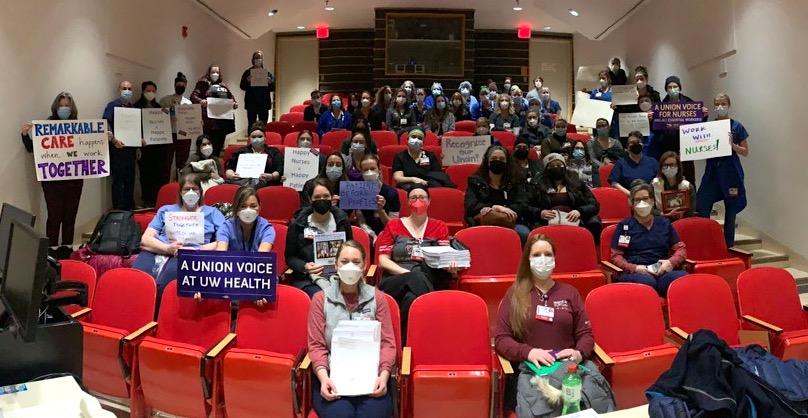At UW Health, nurses and administrators continued to clash over the formation of a union at a meeting in January between nurses and University of Wisconsin Health and Clinics Authority CEO Alan Kaplan.
UW Health nurses presented over 1,500 cards from fellow nurses in support of a union to Kaplan at a meeting Jan. 13 and shared the personal hardships they have faced working at UW Health during the pandemic. Outside the hospital, dozens of nurses demonstrated their support for the union with signs, according to free lance communications director David Bates.
UWHCA Media Relations Manager Sara Benzel said they do not have documentation of the signatures or the amount.
“They claimed to have 1,500 signatures but did not leave anything with us,” Benzel said. “So we do not know how many of those signatures may be from our 3,400 RNs at UW Health.”
Nurses assert the size of their union would ultimately be around 2,600, so they have more than 60% support and growing, Bates said. SEIU Healthcare Wisconsin, a union for nurses, said in a statement that executives at UW Health have cut staffing levels and health and education benefits, leading to some nurses leaving the profession.
The ability to recruit and maintain staff has become more difficult throughout the pandemic as the hospital has faced a strain on the system for nearly two years.
“It’s definitely been really frustrating and stressful and you feel like the people that you work with just aren’t listening to you and they’re profiting off of your sacrifices,” UW nurse Courtney Younkle said. “That’s really, really hard.”
Gov. Tony Evers expressed his support for the union at a Jan. 5 digital forum, where nurses shared their concerns.
Evers issued a statement after the event, stating nurses can advocate best for patients and themselves when given a union voice. This enables them to hold management accountable regarding staffing, health benefits, continuing education funding to recruit and retain nurses, he claimed.
“I want UW Health nurses to know they can count on me to stand with them and do whatever I can to encourage all stakeholders to come together so that the UWHCA Board and administration recognize their union voice,” Gov. Evers said.
In October 2020, the nonpartisan Wisconsin legislative council reviewed state law and concluded that UW health can voluntarily recognize their union and negotiate a contract, according to SEIU.
Act 10, which was passed in 2010, removed the requirement for UWHCA to recognize a union for collective bargaining. The legal council said in a memorandum that employees can seek voluntary recognition for UWHCA to negotiate a contract with. UW Health is currently working with both an employee relations consultant and a legal expert to determine what is legal under Act 10, UW Health press secretary Emily Kumlien said in a previous email to The Badger Herald.
Kaplan issued a message Dec. 21 to all UW staff acknowledging the burdens the pandemic has put on them. In the message, Kaplan reaffirmed his position that UWHCA hasn’t changed its mind and will not acknowledge a nurses union.
In his statement, Kaplan said he hopes the passion of these nurses will be redirected toward the state legislature, which he deems the most appropriate venue for the issue. But some nurses like Younkle in favor of unionizing disagree.
“I think the hospital is willing to take advantage of people who want to work at UW because it’s such a great organization,” Younkle said.
Younkle emphasized the importance for nurses— especially nursing students who work at UW— to stand up for themselves and their patients. Nurses are looking for increased community support, stressing the importance of advocating for safe staffing levels for the patients and quality care for the community, she said.
“The situation is definitely very dire,” Younkle said. “The staffing is getting worse and worse every day as nurses are leaving the hospital and leaving the profession because we just can’t safely take care of our patients.”
Younkle also encouraged nursing students to stand up for themselves when it comes to the nature of their employment and what the hospital offers.
Though she believes the hospital attempted to address the issues nurses are facing, Younkle said they have failed to make substantive change.
“I think that [the hospital has] made efforts to try to address it,” she said. “Unfortunately, a lot of the ways to address it are like band aids to much larger issues that really require them to sit down at the table with the nurses and work with us on how to fix it.”
UW Health nurses aren’t the only healthcare professionals in the state trying to unionize. Frontline workers in La Crosse held a rally after rejecting a union contract with Gundersen Health System Jan. 17.
Though UW Health nurses who want to unionize have the support of Gov. Evers and Mayor Satya Rhodes-Conway, UW Health administrators and staff who want to unionize remain at odds.


